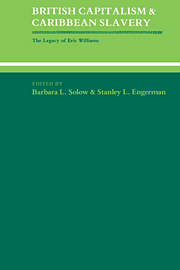Book contents
- Frontmatter
- Contents
- List of Contributors
- Preface
- British Capitalism and Caribbean Slavery: The Legacy of Eric Williams: An Introduction
- Part I Slavery as an Economic Phenomenon
- Part II Caribbean Slavery and the Industrial Revolution
- Capitalism and Slavery in the Exceedingly Long Run
- Slavery and the Development of Industrial Capitalism in England
- The Slave Trade, Sugar, and British Economic Growth, 1748–1776
- Part III The Decline of the British West Indies
- Part IV The Basis of Abolition and Emancipation
- Part V Capitalism and Slavery in Historical Perspective
Slavery and the Development of Industrial Capitalism in England
Published online by Cambridge University Press: 15 December 2009
- Frontmatter
- Contents
- List of Contributors
- Preface
- British Capitalism and Caribbean Slavery: The Legacy of Eric Williams: An Introduction
- Part I Slavery as an Economic Phenomenon
- Part II Caribbean Slavery and the Industrial Revolution
- Capitalism and Slavery in the Exceedingly Long Run
- Slavery and the Development of Industrial Capitalism in England
- The Slave Trade, Sugar, and British Economic Growth, 1748–1776
- Part III The Decline of the British West Indies
- Part IV The Basis of Abolition and Emancipation
- Part V Capitalism and Slavery in Historical Perspective
Summary
Studies of the relationship of the Atlantic slave economy to the development of eighteenth-century English industrial capitalism have traditionally focused on narrow issues of capital and finance. To understand the broader relationships, however, the emphasis must be shifted from profits and the availability of investible funds to long-term fundamental changes in England: the development of the division of labor and the growth of the home market; institutional transformation affecting economic and social structures, national values, and the direction of state policy; and the emergence of development centers. The Atlantic region must be seen as a single interdependent economic region within which the major forces operating on the individual economies were significantly dependent upon the operation of the whole system. Thus it is inadequate to isolate the analysis of the relationship between England and the British West Indies from the whole Atlantic region: it must be considered in the context of the entire region, south and north, east and west.
Economists grappling with the problems of present-day Third World economies have long realized the inadequacy of neoclassical economic analysis for their purposes. That analysis is designed specifically for short-term minute changes at the margin, and it presupposes economies where certain fundamental institutional and structural arrangements are already in place. Students of the Third World, facing economies undergoing long-term institutional and structural change, have found the existing tools of neoclassical economics inadequate; hence the emergence of the sub-discipline called development economics.
- Type
- Chapter
- Information
- British Capitalism and Caribbean SlaveryThe Legacy of Eric Williams, pp. 79 - 102Publisher: Cambridge University PressPrint publication year: 1988

